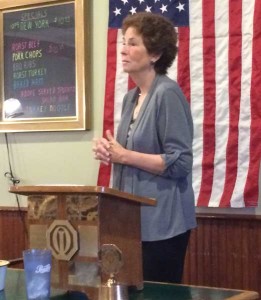Help is available and it is making a difference in lives and dollars saved, thanks to special courts created by Judge Jennie Barkey. The Mental Health Court for adults and the Veteran’s Court were created because of a real need to help those who need help the most. Special courts are not new, Judge Barkey heard about a Mental Health Special Court in Ohio and visited the court to see it in action. With the help of community partners, Genesee County began its own Mental Health Court in 2007.
 A team including two attorneys willing to volunteer time to represent the defendants along with a Genesee Health System clinical liaison work with the defendants. Defendants are screened from a list of all inmates against a list of GHS clients. Once identified, their charges and condition are reviewed and if they qualify an attorney visits with them. Clinical qualification includes diagnosis of bipolar disorder, schizophrenia, or schizoaffective disorder. Legal eligibility excludes certain crimes, such as murder, criminal sexual conduct, armed robbery and major controlled substance offenses. Qualified defendants have to agree to enter the Mental Health Court program and their case is transferred.
A team including two attorneys willing to volunteer time to represent the defendants along with a Genesee Health System clinical liaison work with the defendants. Defendants are screened from a list of all inmates against a list of GHS clients. Once identified, their charges and condition are reviewed and if they qualify an attorney visits with them. Clinical qualification includes diagnosis of bipolar disorder, schizophrenia, or schizoaffective disorder. Legal eligibility excludes certain crimes, such as murder, criminal sexual conduct, armed robbery and major controlled substance offenses. Qualified defendants have to agree to enter the Mental Health Court program and their case is transferred.
A GHS caseworker assists them through the process and they go to court to speak with Judge Barkey once a week. Through a rigorous process they get back on their medication and are kept busy.
“We have had 426 participants and 176 graduates,” stated Judge Barkey.
Those that don’t graduate from Mental Health Court face their initial charges. For those that graduate, it is also a big win for the county, as the cost of incarceration is much higher than the cost of Mental Health Court.
The success of Mental Health Court is now being shared with the Veteran’s Court which started in December of 2012.
Veterans of all generations are affected by post traumatic stress disorder (PTSD). PTSD hit close to home in 2012 for Judge Barkey. Her secretary’s son, Dwayne (Wayne) Cherry, lost his fierce battle with PTSD on January 9th 2012. Wayne’s journey is remarkable and tragic. He attended MSU after high school and graduated cum laud from MSU. Wayne was at MSU on September 11, 2001. He sent the following email to President Bush…
Dear President,
My name is Dwayne Cherry and I am currently a senior at Michigan State University. I wanted to write and tell you that I, like many Americans, was deeply shocked at this attack. I wish you all the best at binding up our nation’s wounds and finding the criminals responsible for this tragedy. Sir, I believe in American, I believe she’s great and I know you will do everything to help her in this time of need. I believe it was Thomas Jefferson who once said, “That the tree of liberty often needs blood to grow.” Sad that this is often the truth but I wanted to reassure you that there are Americans out there still willing to pledge our lives, our fortunes and our sacred honor so freedom will ring. God Bless you and America and guide you in these dark days.
Sincerely,
Dwayne Cherry
He kept his promise and joined the military and served as a counter intelligence agent in the Army for five years. He did a tour in Afghanistan and receive a Bronze Star, three Army commendation medals, two Army achievement medals, meritorious unit commendation, Army good conduct medal, national defense service medal, Afghanistan Campaign medal, non commissioned officer professional development ribbon, Army service ribbon and two overseas service ribbons.
After his years of service, his civilian career mirrored his military career. He married Kate and they had a beautiful daughter. But he secretly struggled with PTSD. In his mind he was protecting his family from what he feared he might do when he took his own life.
Wayne’s story isn’t unique. The suicide rate is an astounding twenty two per day. There are many, many veterans who have lost their battle with PTSD and many more still struggling. They end up in court.
The Veteran’s Court is a team similar to the Mental Health Court with veteran volunteers who administer the program. There are fourteen current participants and there are twelve graduates. Only one has re offended. Court meets once each week, or if doing very well it is changed to every two weeks. The first time is to set up the ground rules with the participant. They have signed a contract and reviewed with the case manager, but Judge Barkey makes it clear that the agreement will be followed or they are out of the program to face their charges.
“I make it clear that I’m not going to be played,” said Judge Barkey.
Judge Barkey made a request of the West Flint Optimist Club to help find more mentors. Mentors must be veterans and they are matched by branch of service. She explained how she is learning new military vernacular and is surprised at the hostility between various branches.
We owe a debt to our veterans and PTSD can show up years after service. Through the Veterans Court they are given an opportunity to seek real help. The success is in the results as their mentors help them get through the process of getting control of their lives. Judge Barkey explained how mentors help the veterans with leaving the house and going to a store. What seems like a simple task to us, can be a threatening task to a veteran suffering from PTSD. Even driving down the highway and going under an overpass can trigger extreme stress. These veterans have been through horrible life changing events in defence of our freedom and way of life. The Veteran’s Court is one way we can break the cycle and provide real help.
“Veteran’s Court isn’t a free pass, but repayment for their sacrifice,” stated Judge Barkey.
